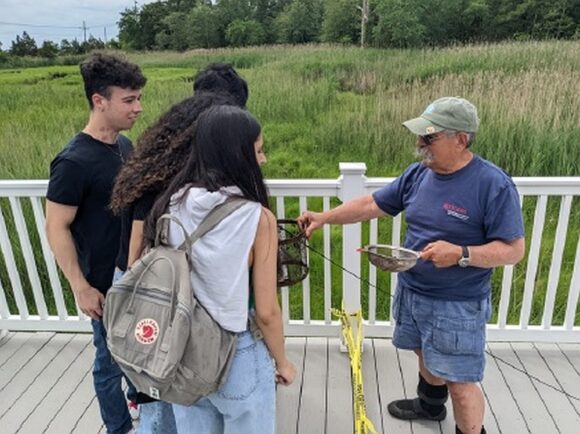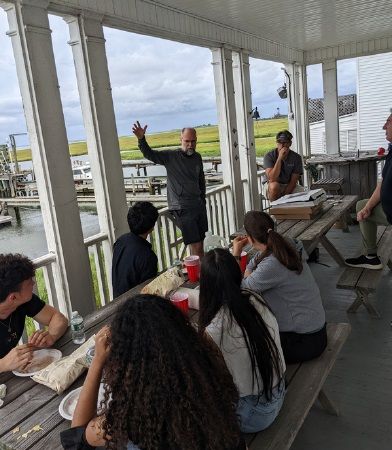
Killifish sampling in the Grassle Pocket Marsh
Task One: Complete
Last December, the Jacques Cousteau National Estuarine Research Reserve (JC NERR,) along with multiple other NJ partners and institutions, were awarded a grant to fund the implementation of the newly-established New Jersey Coastal Community Resilience Consortium. In addition to the JC NERR, partners include Monmouth University, Stevens Institute of Technology, Stockton University, NJ Sea Grant Program, Montclair University, NJ Institute of Technology, and Rutgers University.
The goal of this project, “Barnegat Bay and Great Bays Resilience Observing Network: Tracking the Changing Environment to Inform the Management of Estuarine Resources,” is the integration of climate change research, resiliency planning, and monitoring data to inform the proactive adaptation and management of estuarine resources.
The outcome of the JC NERR and Rutgers University portion of the project is to provide an improved understanding of the information needs of estuarine resource managers to support proactive resilience strategies.
The plan is to accomplish this via three tasks. The first being implementation of a survey distributed to individuals in the regional research and observing system community.

New Jersey Coastal Community Resilience Consortium working with Rutgers University-New Brunswick i.d.e.a. (Innovation, Design, and Entrepreneurship Academy) students.
This past June, JC NERR worked with four Rutgers University-New Brunswick i.d.e.a. (Innovation, Design, and Entrepreneurship Academy) students that assisted with this first task. The students took an existing survey, previously used by NJCCRC team members from Rutgers for an Offshore Wind project. The students worked to take the first steps in modifying the old survey to suit the needs for the NJCCRC initiative.
Once the survey is finalized, it will be distributed to coastal researchers and decision makers to inventory existing long-term monitoring data and observing system capabilities in the Barnegat and Great Bay estuarine systems, and identification of data and observing system gaps required to support proactive resource management. The results of the survey will inform future meetings and strategies to support proactive resource management of the Barnegat and Great Bay estuarine systems.
Finally, information gathered from tasks one and two will be analyzed and compiled into a white paper and serve as the basis for a research plan for developing a predictive capability for managing estuarine resources in the Barnegat Bay and Great Bay/Mullica River region.
In addition to the important survey work the i.d.e.a. students completed, they were introduced to JC NERR. This included a tour of the Coastal Center, a guided walk along the Grassle Marsh Trail and a meet-and-greet with JC NERR volunteer Patrick Filardi to learn about killifish sampling in the Grassle pocket marsh. An evening event at the Rutgers University Marine Field Station (RUMFS) also provided the students with the opportunity to network with field professionals.

